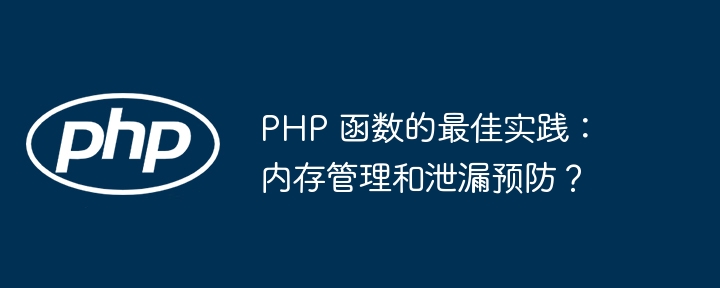Home >Backend Development >PHP Tutorial >Best practices for PHP functions: memory management and leak prevention?
Best practices for PHP functions: memory management and leak prevention?
- WBOYWBOYWBOYWBOYWBOYWBOYWBOYWBOYWBOYWBOYWBOYWBOYWBOriginal
- 2024-05-03 17:12:021167browse
In PHP, memory management is crucial to prevent memory leaks. Best practices include: avoiding circular references, using global variables with caution, and managing static variables correctly. Other tips include using object pools, using memory analysis tools, and freeing memory regularly. In the actual case, objects are reused through object pools, which avoids memory leaks caused by repeatedly creating and destroying objects.

Best Practices for PHP Functions: Memory Management and Leak Prevention
Introduction
Memory management in PHP is critical to ensuring the efficiency and stability of your application. Memory leaks can hinder application performance or even cause system crashes. Therefore, it is crucial to understand the best practices for memory management in PHP.
Memory Management Basics
PHP is a garbage collected language, which means that it automatically releases variables and objects that are no longer used. However, there are several situations where memory leaks can occur:
- Circular Reference: Occurs when two or more variables refer to each other, preventing the garbage collector from freeing them .
- Global variables: When variables are declared outside a function, they will always exist in memory even if they are no longer needed.
- Static variables: Static variables declared in a function will remain in memory after the script is executed.
Best Practices
Avoid circular references
- Use weak references (
WeakReference) to break the reference cycle, allowing one of the objects to be released without affecting the other. - Use the
unsetfunction to explicitly release references to objects that are no longer needed.
Use global variables with caution
- Use global variables only when absolutely necessary.
- Declare and initialize global variables in functions, not in the script global scope.
Manage static variables correctly
- Use static variables only when you need to persist the value after the script is executed.
- Ensure static variables are reset or destroyed when no longer needed.
Other tips
- Use object pool: Create an object pool to reuse objects and avoid repeatedly creating and destroying objects .
- Use memory analysis tools: Use tools such as Xdebug or Blackfire to detect and analyze memory leaks.
-
Release memory periodically: Use the
gc_collect_cyclesfunction to explicitly trigger garbage collection.
Practical case: Use object pool to prevent memory leaks
// 对象池类
class ObjectPool {
private $objects = [];
public function get($type) {
if (isset($this->objects[$type])) {
return array_shift($this->objects[$type]);
}
return new $type;
}
public function release($type, $object) {
$this->objects[$type][] = $object;
}
}
// 用法
$pool = new ObjectPool();
// 从对象池获取对象
$obj1 = $pool->get('MyObject');
$obj2 = $pool->get('MyObject');
// 使用完对象后
$pool->release('MyObject', $obj1);
$pool->release('MyObject', $obj2);By using object pool, you can reuse MyObject instances to prevent repeated Memory leaks caused by creating and destroying objects.
The above is the detailed content of Best practices for PHP functions: memory management and leak prevention?. For more information, please follow other related articles on the PHP Chinese website!

